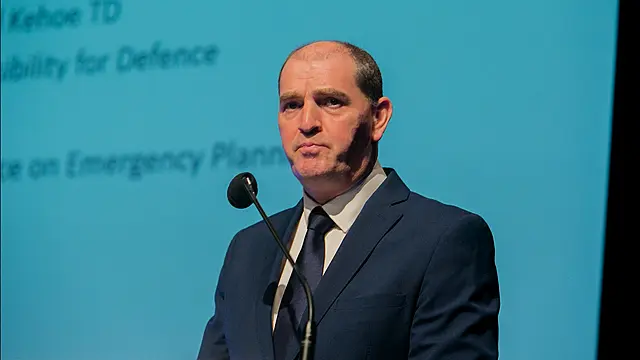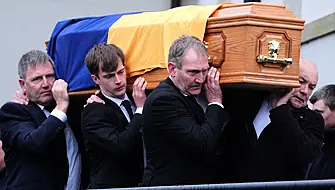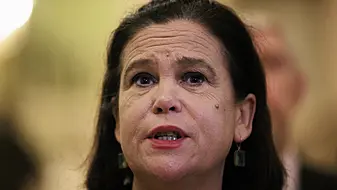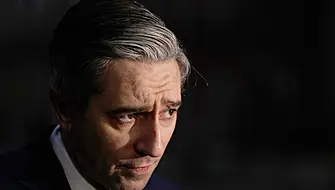Here, we have a look at the issues set to dominate political discourse and Dáil discussion in the next week.
RTÉ scandal
Anyone who thought the Ryan Tubridy Oireachtas hearings would be the end of the RTÉ scandal was sorely mistaken.
The national broadcaster is back in the spotlight for all the wrong reasons.
It has emerged that former RTÉ chief financial officer Breda O’Keefe received a payout of €450,000.
The ongoing fallout from the Toy Show musical has also been one of the main points of this week's Oireachtas media committee hearings.
Sinn Féin's proposal of scrapping the TV licence was rejected, but more reforms will surely be a topic of discussion from Government and Opposition TDs.
Another Fine Gael departure
During the week, Paul Kehoe became the 10th Fine Gael TD to confirm he would not be contesting the next general election.
Mr Kehoe, 51, also reflects a growing trend of politicians seeking new careers rather than a lifetime of service. Fine Gael would point to this, however, some Leinster House insiders have privately claimed it is part of a wider trend, with many sitting TDs predicting a difficult election cycle for the party.
Mr Kehoe is another loss of experience to the party as well. He served 22 years in the Dáil and held the positions of government chief whip and Minister of State at the Department of Defence.
Opposition will view the departures as a sign of trouble for Fine Gael ahead of the next election.
Sinn Féin dilemma
Sinn Féin's recent slip in the polls has been attributed to their uncertain stance on immigration. In fairness, they're not the only party grappling with the issue.
It will continue to be a problem as people with legitimate concerns around local services and amenities have to be distinguished from far-right agitators and extremists who have been burning out buildings earmarked for asylum-seeker accommodation.
Despite their poll slumps, they are still by far the most popular party in the country and look likely to be in power sooner rather than later, whether that is as part of a left-wing coalition or an uneasy partnership with Fianna Fáil.
With this in mind, they will have to shift from being the party of opposition to one in power.
Certain policies will require big changes, sometimes making them less radical, which could alienate a lot of their core base of supporters.
One example of this was seen during the week when they issued a motion calling for the TV licence fee to be scrapped in favour of an Exchequer-funded approach.
While this could be seen as a populist policy, one that the majority of people may sympathise with given the ongoing RTÉ scandal, it was opposed by Government and plenty of fellow opposition TDs.
This was demonstrated during the week when Labour's Aodhán Ó Ríordáin called the motion a "stunt" to distract from other issues.
“It feels like a stunt really, it doesn’t really feel like conviction politics,” Mr Ó Ríordáin said.
“It feels like ‘let’s stop talking about immigration’ politics. Sinn Féin are on the back foot on immigration, and they’re on the back foot on Gaza because they’re going to the White House.
“So they need to talk about something else, and they’ve decided to talk about the TV licence. And I’m assuming they want this debate to turn into something similar in terms of other levies and charges that they were against down through the years.
“We need to have a discussion about how to fund RTÉ, RTÉ is extremely important. We believe in service broadcasting, it’s very important to us.
“You can’t run two television stations and a number of radio stations and have children’s television and Irish language television and an orchestra and investigative reporting and top quality sports coverage and not pay for it.
“A huge amount of RTÉ income is based on commercial revenue, is based on advertising, and that’s not sustainable.
“So we have to have a debate on the licence fee, but I don’t think this sort of subtle nod from Sinn Féin to people to not pay their TV licence, which I think is what they’re doing, is the way to do politics."
Abroad
In the US, all focus seems to be on the age of the likely presidential candidates, Donald Trump, 77, and Joe Biden, 81.
The age issue was thrust front and centre again after special counsel Robert Hur, a Republican former US attorney in Maryland during Mr Trump's administration, said in his report on Mr Biden's handling of classified documents last week that Mr Biden was a "well-meaning, elderly man with a poor memory" who was not able to recall to investigators when his son, Beau Biden, died.
Mr Biden angrily denied Mr Hur's allegations about his memory, saying in a White House appearance that "my memory's fine". However, in the same speech, he confused the president of Mexico for Egypt's.
Mr Trump is also prone to gaffes, most recently mistaking Republican rival Nikki Haley for Democrat former US House speaker Nancy Pelosi. He also frequently makes statements which suggest he believes predecessor Barack Obama is still in the White House.
However, the age worries appear to be impacting Mr Biden more than Mr Trump. This could be put down to Mr Trump's fanatical base of supporters or his energy, which remains huge.
In the UK, the Conservatives took a huge hit in by-elections this week.
Labour dealt a crushing blow to UK prime minister Rishi Sunak's Conservatives on Friday, winning contests for two new MPs in votes that suggested the opposition party was on track to win a British general election later this year.
The double defeat underlined the flagging fortunes of the governing party and will do little to silence Mr Sunak's critics, who fear the Conservatives could face an all-but wipe-out at the UK general election and want him to change course.







